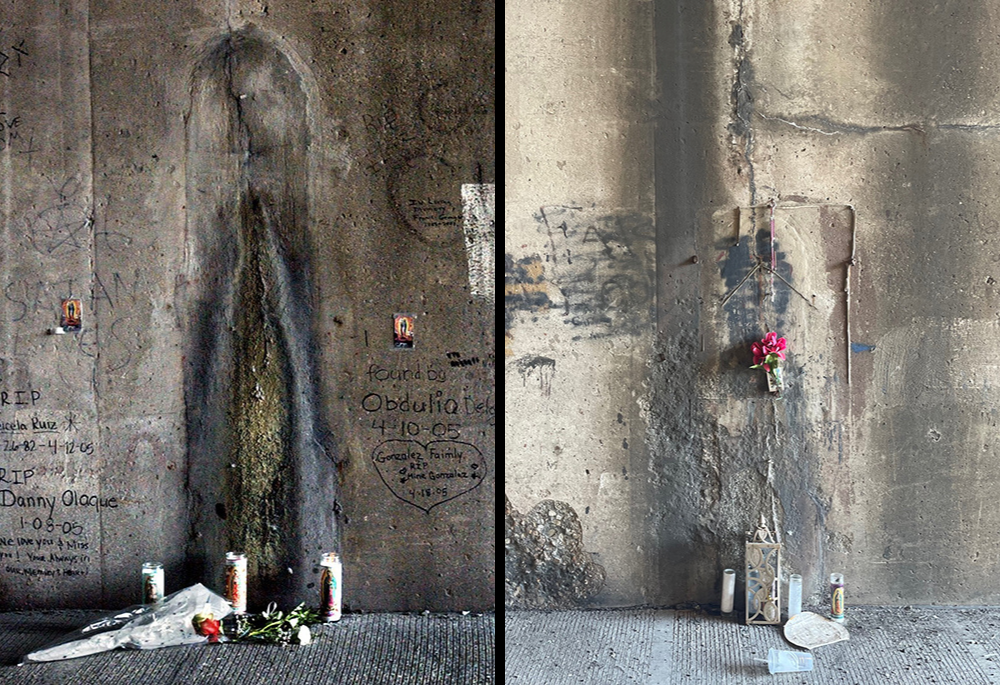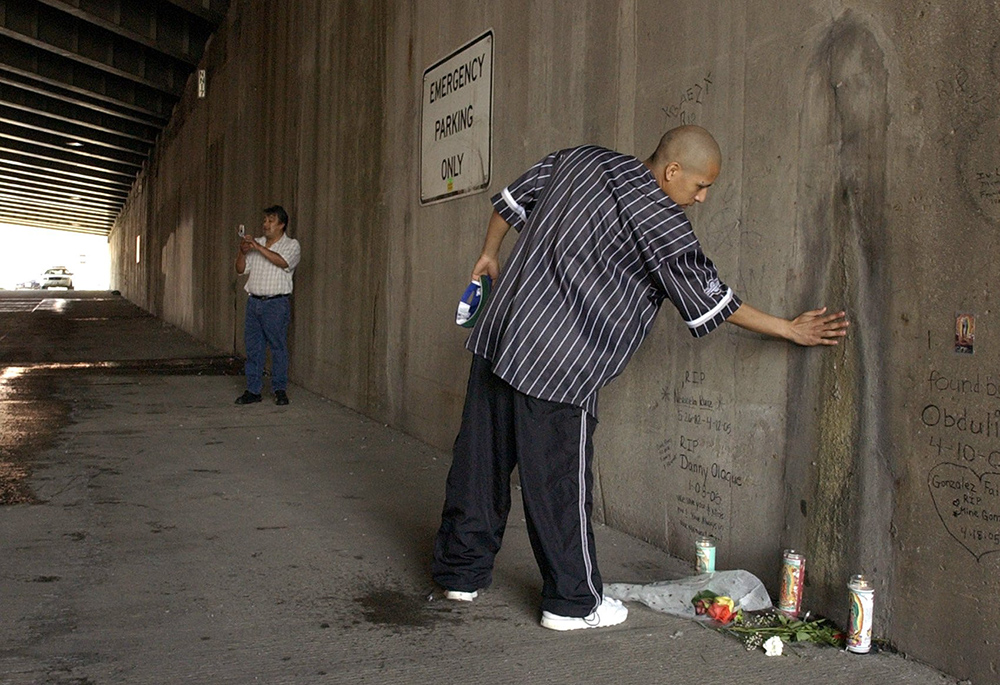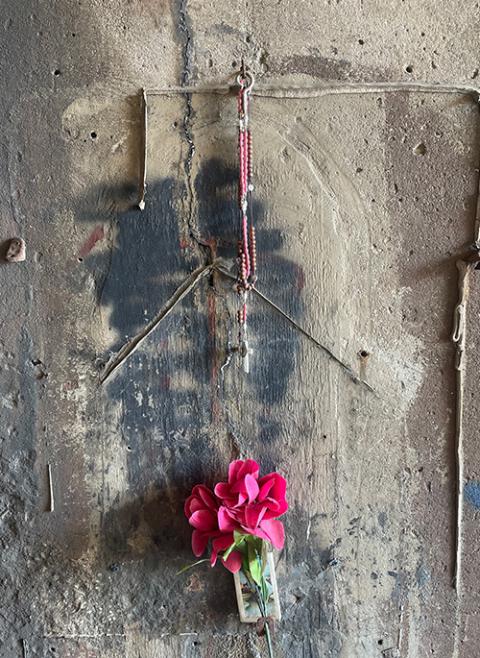
At left, an image said to resemble the Virgin Mary is pictured underneath the Kennedy Expressway in Chicago April 18, 2005; at right is a photo of the image that Gustavo Arellano took in June 2023. The image is known as Our Lady of the Underpass. (CNS photo/Karen Callaway; Gustavo Arellano)
Earlier this month, I traveled to Chicago for the first time in years. When I'm in the Windy City, it's always for business and barely any leisure. This time, I made sure to carve out time for the Virgin Mary.
Every time I had visited, I tried and failed to get to an underpass of the Kennedy Expressway about a mile and a half west of DePaul University. In 2005, local and national media reported that Catholics had gathered there to venerate what they claimed was an image of Mary on a concrete wall.
The Illinois Department of Transportation said at the time that it was nothing more than a stain created by salt runoff. Wags called the image Salt Stain Mary, the Viaduct Virgin or Our Lady of the Underpass, the name that stuck in Chicagoland. But those linguistic dismissals didn't stop the faithful from leaving flowers and votive candles on the sidewalk below and holding vigils on the site for weeks. Some even wrote testimonials on the wall.
Then-Cardinal Francis George held a news conference to deny that an apparition had in fact happened but nevertheless championed Our Lady of the Underpass. "God has many ways to stir up devotion in people's hearts," George said. "If it's helpful in reminding people of the Virgin Mary's care for us and love for us, that's wonderful."
If you look at photos from the time, you have to use your imagination to see even a hint of Mary's face or any part of her body. I saw mostly a worn wall in those old shots. Cracks. Gradations of gray. Bumps. What's unmistakable is the oval shape that starts at face level and goes all the way down to the ground. It'll remind any Catholic of the rays of light that surround the Virgin of Guadalupe.

A man walks up and touches an image some people think looks like the Virgin Mary seen underneath the Kennedy Expressway in Chicago April 18, 2005. At the time, many Chicagoans came by to view the image, pray or take pictures of it. (CNS photo/Karen Callaway)
Our Lady of the Concrete earned detractors as well. Someone wrote "Big Lie" in shoe polish over it. Street artists drew mocking eyes and a mouth. Later, someone painted a devil face along with "666."
But faith always won out. Locals cleaned up the defacements. Someone laid a concrete slab to serve as a makeshift altar. Playwright Tanya Saracho debuted an award-winning play in 2009 about the affair that tailored together interviews with believers and skeptics in a way that the Chicago Reader described as "sometimes hilarious, sometimes moving."
I wasn't sure what to expect when a friend picked me up from my hotel on a Saturday morning. The years had not been kind to Our Lady of the Underpass. Via Google Street View, I saw images of the site dating back to 2007. They showed fewer and fewer offerings as the years passed. By 2018, a homeless encampment had set up in the underpass, although tents and sleeping bags stayed far away from Our Lady of the Underpass, as if the unhoused didn't want to disrupt the holy.
The most recent Google Street View shot dates to last September. All that was left to honor here were flowers taped to the wall and empty vases.
My friend and I parked down the street from the site. Traffic roared past us and above us.
Advertisement
Near the Kennedy Expressway onramp, a mother and her daughter were sitting on the sidewalk, while a man unsuccessfully asked for donations.
I made the sign of the cross when I finally saw Our Lady of the Underpass. She stands on the northeastern corner, separated from busy Fullerton Avenue by concrete pillars and a small alley where motorists can pull over in case of an accident or emergency.
She's in worse shape than ever.
The original white salt stains that the faithful said formed Mary's robe was gone. Where people once saw her face were now scrawls of black spray paint. Someone had tried to outline the image with what looked like rubber. Around her were layers upon layers of paint, hints of how many times city workers had covered up vandalism.

In this 2023 photo, two rosaries hang from a hook, above where the slightest outline of what some see as a head is visible, at the image known as Our Lady of the Underpass. (Gustavo Arellano)
And where the small altar once stood were now some candles, a lantern cage, a discarded paper plate and an empty Taco Bell cup.
My friend admitted to having never visited Our Lady of the Underpass, always in a rush to get somewhere. But he definitely knew about her. "She used to be more pronounced," he said apologetically.
We made our mini-pilgrimage at a precarious time for the Archdiocese of Chicago. The latest parish directory lists 203 parishes as having merged with others in the past six years under Cardinal Blase Cupich"s "Renew My Church" initiative, which seeks to shutter churches with declining attendance and merge them with others. Of those now closed, 33 were named after the Virgin Mary, whether directly, as one of her honorifics (Queen of Angels) or as one of her apparitions such as Our Lady of Knock or Our Lady of Fatima.
Yet devotion to Mary in the Second City in the form of Our Lady of Guadalupe is stronger than ever. Murals of la Guadalupana are all over the city's Latino neighborhoods, like Pilsen and Little Village. In the northern suburb of Des Plaines stands the Shrine of Our Lady of Guadalupe, which holds an annual vigil on her Dec. 12 feast day that's the largest in the United States. The shrine celebrated its 10th anniversary on June 10 but has hosted the faithful for decades.
![In this 2023 photo, taken to the right of the image known as Our Lady of the Underpass, someone had tagged a message in gray marker on the wall. "Dear God [and] Blessed Mother please look over my Grandma and Mom and keep them healthy thank you." (Gustavo Arellano)](/files/2023-06/IMG_5815.jpg)
In this 2023 photo, taken to the right of the image known as Our Lady of the Underpass, someone had tagged a message in gray marker on the wall. "Dear God [and] Blessed Mother please look over my Grandma and Mom and keep them healthy thank you." (Gustavo Arellano)
As a guadalupano — someone who holds a special devotion to Guadalupe — I would have loved to attend. But I was only in Chicago for the weekend. Besides, Our Lady of the Underpass speaks to the faith more than an archdiocese-sanctioned shrine.
She might no longer get national attention, or the same local devotion — but the candles holding various levels of wax that my friend and I saw attested to the fact that people still come, still believe. So did two rosaries that hung from a hook, above where the slightest outline of a head was visible. Approximately where Guadalupe's hands would be clasped, someone had placed plastic flowers and a small booklet with an infant dressed in baptismal white on the cover above the words "Mi Pequeña Biblia" — my little Bible.
To the right someone had tagged a message in gray marker on the wall. "Dear God [and] Blessed Mother please look over my Grandma and Mom and keep them healthy thank you."
I humbly ask Chicago to do the same with Our Lady of the Underpass.





